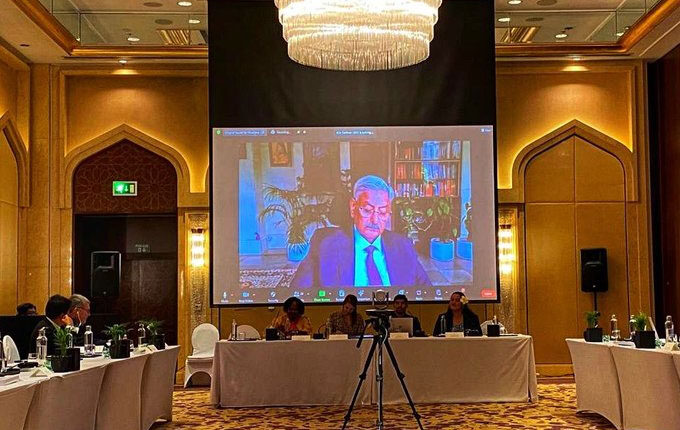“A safeguards information system for ‘Reducing Emissions from Deforestation and forest Degradation’ necessary”
Says NHRC, India Chairperson Justice Shri Arun Mishra Addressing the NHRI COP28 SYMPOSIUM on ‘Climate change and Human Rights’ in Dubai
- Climate change is one of the leading causes of migration besides the war
- NHRIs have to work to protect the environment and address the needs and rights of the people impacted by climate change
- Citizens must change their mindset and adopt an eco-friendly approach to their day-to-day lifestyle
New Delhi :The National Human Rights Commission, NHRC, India Chairperson, Justice Shri Arun Mishra today said that a safeguards information system for ‘Reducing Emissions from Deforestation and forest Degradation’ is necessary to minimize the negative impact of climate change and capacity-building programs by training. He said that climate change impacts human rights in a big way; with melting polar ice, rising sea levels, increased drought, high-density rainfalls, cyclones, floods, landslides, and forest fires, the poorest of the poor suffer the most.
Justice Mishra was addressing a session on ‘Empowering those most affected by Climate Change in the NHRI COP28 SYMPOSIUM’ on ‘Climate change and Human Rights: the role of National Human Rights Institutions’ organized by the Global Alliance of National Human Rights Institutions (GANHRI) in Dubai. He said that besides the other stakeholders, the NHRIs have to work to protect the environment and address the needs of the people impacted by climate change-induced displacements resulting in violation of human rights including the rights to shelter, livelihood, education, and health, among others.
Referring to the UN report relating to the Sustainable Development Goals (SDGs) 2023, he said that the energy resources need a careful transition. Otherwise, the loss of money from the energy industry could cause destabilization “internally, regionally and even internationally.” The International Labour Organization (ILO) report highlighted that approximately one-third of jobs in G20 nations directly depend on effective environment management and sustainability.
Besides the war, Justice Mishra said, climate change is one of the leading causes of migration. Transition to climate-resilient infrastructure and mitigation measures are essential for the survival of humanity. Air and water pollution are reducing human life span. He said that vanishing water bodies due to large-scale construction, depleting water levels, and contaminated groundwater are also issues of serious concern. Industrial hazards like gas leakage have now become commonplace incidents. Plastic has seriously threatened environmental pollution on the earth and the seas endangering biodiversity. The plastic patch in the ocean reportedly is 20 times larger than the size of France. Therefore, plastic recycling is required.
Justice Mishra said that the business must respect human rights. In India, the concept of corporate social responsibility has been inserted in Section 135 of the Companies Act, requiring big business houses and industries to spend 2% of their net profit protecting the environment and persons affected.
Justice Mishra said that the NHRC, India proactively addresses the environment-related issues and ensures justice by recommending payment of compensation. It has decided on 8,916 cases relating to environmental degradation on complaints as well as on a suo motu basis. Several cases relating to contamination of groundwater, protection and restoration of water bodies, and providing portable drinking water have been taken up by the Commission and directions issued to the concerned authorities. The closure of several polluting industries has been secured through Pollution Control Boards to ensure compliance with safety norms.
The Commission has set up a Core Group on Environment and has been holding discussions on various aspects relating to climate and the environment. An Advisory on environment pollution emphasizing the expeditious punishment of polluters and violators of environmental laws, prevention and minimization of vehicular pollution, and strengthening and capacity building of local bodies to deal with environment issues has been issued. Requests have been made to all states to grow trees in every district.
The Commission is also hearing in its suo motu proceedings the Union and States on the reported high air pollution impacting life expectancy in the country and how to reduce various types of pollution to ensure a healthy life and an ambient atmosphere.
The NHRC, India said that citizens must change their mindset and adopt an eco-friendly approach to their day-to-day lifestyle. The hour needs to conserve natural resources and biodiversity, restore degraded resources, reduce waste and pollution, and GHG emissions, build resilience to climate change, replicate best practices, and make them region-specific for a visible impact.

